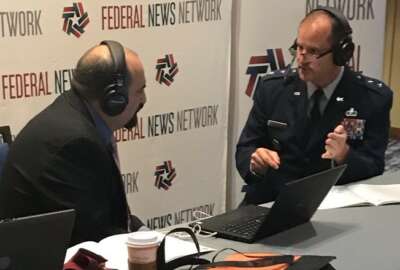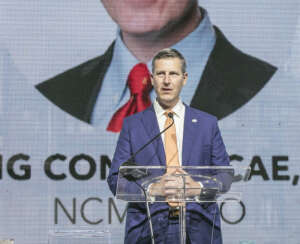
At a crossroads: Federal acquisition must evolve more rapidly
Kraig Conrad, the CEO of the National Contract Management Association, said acquisition and contracting officers must take advantage of automation to be more agile...
Best listening experience is on Chrome, Firefox or Safari. Subscribe to Federal Drive’s daily audio interviews on Apple Podcasts or PodcastOne.
Let’s just state the obvious — agency contracting officers and other acquisition professionals jobs aren’t getting any easier, anytime soon.
Before you say, “Thanks for nothing,” the National Contract Management Association believes there is plenty of light at the end of the tunnel.
Kraig Conrad, the CEO of NCMA, said a new survey of federal acquisition professionals gives his organization’s members plenty of hope that the acquisition workforce will see some burden relief in the coming years.
“We are at a crossroads,” Conrad said in an interview at the recent Government Contract Management Symposium in Arlington, Virginia. “What we do next will be very important given the changes that are coming in the profession.”
Through the survey, which polled federal senior procurement executives and chief acquisition officers, NCMA came away with three main findings that helps answer the question of what they can do next to bolster and evolve the federal acquisition workforce.
NCMA said the three findings from the survey were:
- The role of the contracting officer is changing.
- The business of contracting is changing.
- The workforce is changing
“All these changes that are coming, what are going to be the implications both to the organization and the workforce that they have available to them, and to some degree, the processes that they use to do acquisitions and procurements?” Conrad said. “In finding one, the big conversation was really about the new role of contracting. The contract manager at the center of that is faced with a lot of different distractions. On the Defense Department side, there is the desire to compete with our near peer competitors or outpace them. On the civilian side of that equation, you certainly are looking at global dynamics that draw against both the workforce and the landscape from which we procure. Those were big headwinds for a lot of our ability to attract and retain talent.”

In the survey, respondents pointed to the need to shorten the procurement-cycle and make the contracting officer more agile and focused on providing solutions.
Conrad said acquisition professionals need to better define their new roles as solution maker versus compliance officer that may limit the ability to have impact.
“There is a way we can operate today that we can, within this construct, find good answers to move forward. That will just require us to be more knowledgeable,” he said.
One factor that cuts across all of these findings is the need for top cover from agency executives to let contracting officers and program managers try different and new things.
Conrad said the Air Force, for example, is giving its acquisition teams a lot of leeway to do smart experiments, whether through its use of other transaction authority or pitch days, or other innovative approaches.
“We heard from a lot of our senior procurement executives that in an environment where they feel they have top cover, the risk aversion conversation is easier to overcome. Otherwise, you will go right back to the same old model where everyone is trying to protect themselves,” he said. “That top cover really only comes when someone in leadership structure is not afraid to get in trouble. You run into situations where the senior leadership doesn’t feel they are covered or protected. It will take leaders stepping out and leaning over these challenges to be able to open challenges for their workforce.”
Technology’s impact is clear
Conrad said the respondents recognized the pressure and possibilities of technology that is and will continue to impact federal acquisition.
“Most senior leaders interviewed expect a decisive shift from tactical to strategic work as technology takes on more basic or repetitive tasks. This means that some of the process-oriented tasks, such as preparing routine administrative contract modifications, could be fully automated and therefore devalued as a core competency of the contracting workforce,” the survey white paper states. “Several senior leaders even described a future in which an encyclopedic knowledge of the rules and regulations will be devalued as artificial intelligence further automates their application to acquisitions or incorporates regulatory provisions and requirements into contracting app algorithms.”
Related Stories
Conrad said senior procurement executives also recognized that they must update and modernize acquisition processes before technology can truly help them, otherwise the old adage, “garbage in, garbage out,” will ring too true.
“We need to get better at how we train into the workforce. Those that have data science understanding need to tell a really good story with data,” he said. “How are the contracting officers the solution makers? That really comes down to competency. What are those balance of skills that will allow someone to be competent as a business leader in this function? That is one of the areas, because of technology advances, that the technical components will soon be outweighed by the software skill needs.”
More soft skills necessary
Conrad said those softer skills include things like having the baseline knowledge of the problem or mission, products and related markets.
“Several senior leaders interviewed described a future where contracting professionals would absorb other new responsibilities as well — from areas such as supply chain management, requirements generation, and program management,” the white paper states. “Most senior leaders interviewed expect a decisive shift from tactical to strategic work as technology takes on more basic or repetitive tasks. This means that some of the process-oriented tasks, such as preparing routine administrative contract modifications, could be fully automated and therefore devalued as a core competency of the contracting workforce. Several senior leaders even described a future in which an encyclopedic knowledge of the rules and regulations will be devalued as AI further automates their application to acquisitions or incorporates regulatory provisions and requirements into contracting app algorithms.”
With the survey results final, NCMA plans on taking a two-track approach to help facilitate change.
First, Conrad said the association is meeting with federal acquisition leaders and workers to discuss the results and find out more about their roadblocks.
“We have started a process to provide more micro-learning and opportunities for someone to attest to an ability or to credential themselves much sooner in the process,” he said. “That’s the dramatic shift. We can’t just put you in front of a fire hose and then when you need information later, it will somehow magically appear from your brain and you are ready to go.”
Copyright © 2025 Federal News Network. All rights reserved. This website is not intended for users located within the European Economic Area.
Jason Miller is executive editor of Federal News Network and directs news coverage on the people, policy and programs of the federal government.
Follow @jmillerWFED





